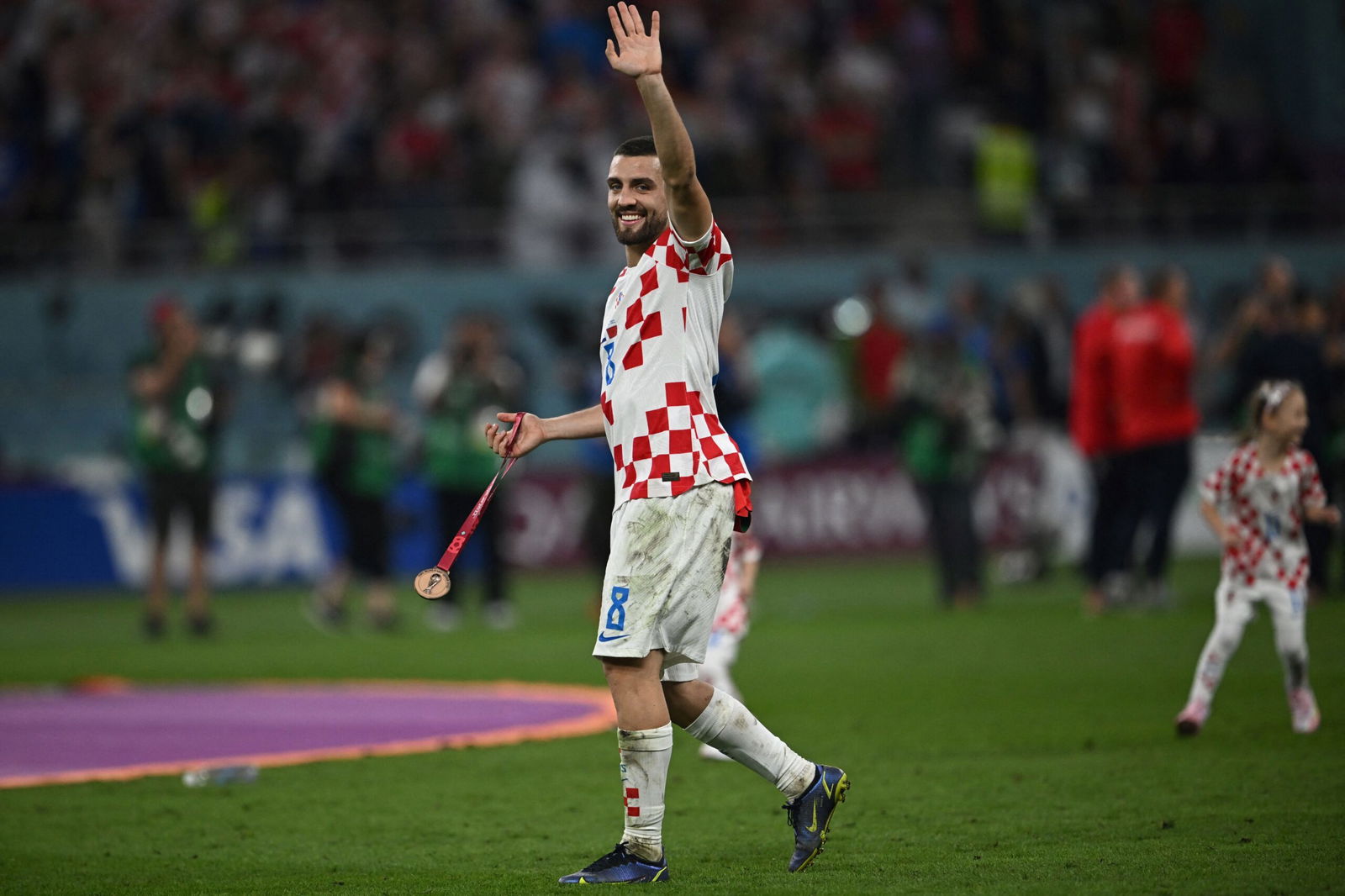Features
Kovacic leads the way after Ziyech’s historic run: How Chelsea’s players fared at the 2022 World Cup

The 22nd FIFA World Cup has come to a breathtaking end, Argentina crowned World Champions for a third time – edging over France in a phenomenal final eventually decided on penalties.
Club football returns on Tuesday for Chelsea, who face Bournemouth at Stamford Bridge in the Premier League, some 37 days after their 1-0 away defeat to Newcastle in mid-November.
Graham Potter will hope Chelsea can kick on in the second half of the season, with the Champions League and FA Cup still to play for, as well as hopes of another top-four league finish.
Chelsea had a total of 12 current squad players participating at the World Cup, the joint sixth-most of any club globally, plus Ethan Ampadu, Romelu Lukaku and Baba Rahman representing Wales, Belgium and Ghana, respectively, who are currently out on loan for the 2022/23 season.
How did Chelsea’s crop fare at a fantastic tournament that provided endless goals, upsets and entertainment?
Cesar Azpilicueta – Spain
Cesar Azpilicueta, the longest-serving Blue in the current squad, hasn’t always enjoyed a huge amount of gametime for the Spanish national side since his debut in 2013, coaches often opting for Real Madrid’s Dani Carvajal at right-back and Barcelona’s Jordi Alba at left back, although Dave made the Spanish squad for Qatar, providing both experience and versatility in defence.
Azpilicueta played the full 90 minutes in Group E’s opener versus Costa Rica – a 7-0 drubbing in which Spain were 4-0 up within 10 minutes of the second half. Spain’s backline – including City duo Rodi and Aymeric Laporte, was rarely tested, if at all, with Costa Rica not managing a single shot on goal, and recording a mere 18 percent possession. However, Azpilicueta was reliable at right-back, playing 90 of 95 successful attempted passes, as well as four accurate long-balls to keep Spain on the front foot.
Azpilicueta was omitted from the starting side for the following 1-1 draw with Germany, before returning to the side in the crucial Group Stage finale versus Japan. However, the Spanish defence struggled to cope with the pace and energy of the Japanese attack – Azpilicueta losing possession four times before he was replaced at half-time by Dani Carvajal.
Azpilicueta was an unused substitute as Spain lost on penalties to eventual semi-finalists Morocco in the round of 16, Luis Enrique utilising Marcos Llorente in an unconventional right-back role. At 33, it is unlikely Azpilicueta will feature at another World Cup, although participation in the 2024 Euros remains a distant possibility.
Conor Gallagher – England
Conor Gallagher was considered by many a surprise inclusion for England at the 2022 World Cup, only making his full senior debut in November of last year. The midfielder has had a mixed season for Chelsea so far – highs including a last-minute winner versus former-side Crystal Palace, although disappointments included a first-half sending off versus Leicester in September.
With England fairly stacked in the midfield area, and Gareth Southgate often preferring the experience of Jordan Henderson in important games, Gallagher didn’t feature at all in Qatar.
The 22-year-old will be disappointed he didn’t pick up any minutes late on in wins against Iran and Wales, although he has a long international career ahead of him, and will hope for a more impactful contribution in the next Euros and World Cup, respectively.
Kai Havertz – Germany
Despite only turning 23 in June, Kai Havertz has picked up 33 Germany caps to date, making his full senior debut in 2018 – becoming the first German born in 1999 to represent the national team. Havertz’s versatility is rated by coach Hansi Flick, although debate rages amongst fans as to the forward’s best position in attack – be it as a ‘false 9’ or operating behind a more traditional striker.
Havertz was relatively disappointing in Germany’s Group E opener – a 2-1 defeat to underdogs Japan. The forward only managed 27 touches in 79 minutes, before being replaced by Niclas Füllkrug with the score 1-1. An unused substitute in the following draw with Spain, Havertz started on the bench in the crucial clash versus Costa Rica – Germany needing a win, and also hoping Spain could beat Japan to progress to the knock-out stage.
Havertz entered the fray in the 66th minute, four minutes before Manuel Neuer conceded to Juan Pablo Vargas, putting Costa Rica 2-1 ahead. Havertz made an instant impact, scoring a brace in 12 minutes from an Expected Goals (xG) of 1.36, as Germany won 4-2 on the night, eventually crashing out of the group on goal difference for the second successive World Cup. Havertz was awarded Man of the Match for his contributions during the game.
Aged 27 at the next World Cup, Havertz will be hoping Germany can progress far deeper into the tournament – given the wealth of young talent in their squad, including ex-Blue Jamal Musiala, as well as Bundesliga duo Youssoufa Moukoko and Karim Adeyemi.
Kalidou Koulibaly – Senegal
Born in northeastern France, Koulibaly featured 11 times for France’s U20 national side, before switching allegiance in 2015 to Senegal – the nationality of both his parents. An important member of the Senegalese squad, the centre-back made his 65th appearance in the 0-2 defeat to the Netherlands in Group A, playing the full 90. Despite the disappointment of the result, Koulibaly had a fairly solid game, making 10 tackles and clearances, winning three of four aerial duels, and playing seven accurate long-balls to launch counter attacks to Senegal’s pacy wingers.
Koulibaly also played the full 90 in the 3-1 win over host’s Qatar, although the Senegal back-line was rarely seriously threatened. The 2-1 win over Ecuador in the group finale was a personal highlight for the defender – scoring the winner in the 70th minute, a right-footed volley, sending Senegal into the round of 16 and setting up a tie with England. The centre-back also exhibited his defensive quality; winning 100% of his ground duels, and making 14 tackles and clearances, winning the Man of the Match accolade in the process.
Despite a disappointing showing v England, losing possession 19 times and only completing 67% of his attempted passes, Koulibaly had a fairly decent tournament in Qatar, and will be keen to continue this form into a packed schedule for Chelsea in January and beyond, and forge a more established relationship with Wesley Fofana, who is set to return from injury in a few weeks time.
Mateo Kovacic – Croatia
Kovacic, 28, was runner-up with Croatia in Russia in 2018, and has formed an incredible midfield partnership with Real Madrid’s Luka Modric and Inter Milan’s Marcelo Brozovic in recent years at international level. Croatia were drawn in a tough group alongside Belgium, Canada and Morocco in Group F, with two of the group’s participants finishing third and fourth, respectively.
Kovacic started and played 79 minutes in the opening 0-0 draw with Morocco, a tense and tactical battle, before playing 86 minutes in the convincing 4-1 win over Canada. Kovacic completed 100 percent of his dribble attempts, 93 percent of his attempted passes, and also created two big chances, evidencing his quality in midfield that Chelsea fans have grown accustomed to in recent years.
Kovacic started both games versus Belgium and Japan before being substituted late on, and also picked up 105 minutes against Brazil in the quarter-final – Croatia’s second successive game that was decided on penalties. Up against Casemiro in midfield, Kovacic won 8/13 of his ground duels, also completing 91 percent of his passes, as Croatia edged through to set-up a historic second semi-final clash in as many tournaments, facing eventual winners Argentina at the Lusail Stadium.
Kovacic had a decent game versus Argentina, completing 95 percent of his passes and winning 10 ground duels, although the quality of Lionel Messi and Julian Alvarez simply blew the Croatians away. A second meeting with Morocco saw the third place up for grabs – Kovacic again averaged a pass completion rate of over 90 percent, including six accurate long balls and one key pass, as Croatia finished third after an entertaining 2-1 win.
Despite the disappointment of failing to reach another final with his country, Kovacic had a fine tournament overall – Chelsea fans are more than aware of this quality, and will hope the midfielder can remain fit for much of the remainder of the season, after struggling with injuries in the last few campaigns.
Edouard Mendy – Senegal
Like club teammate Koulibaly, Edouard Mendy was also born in France, and progressed through the academy of Le Havre, although he opted to represent Senegal, the nationality of his mother, making his full debut in 2018, after an impressive season with Reims who gained promotion to Ligue 1.
Mendy’s form for Chelsea has been shaky to say the least since the end of 2021, the 3-2 away defeat to West Ham in the Premier League arguably the key turning point – with the keeper losing his place to Kepa Arrizabalaga under Graham Potter after a series of high-profile mistakes. Mendy’s poor form sadly continued at international level – he was at fault for the Netherlands second goal in their 2-0 win over Senegal in Group A, and also conceded Qatar’s only goal of the tournament in the following game, a 3-1 victory at the Al Thumama Stadium.
Mendy’s distribution was also poor in Senegal’s final Group Stage game versus Ecuador – completing just 12 of 26 attempted passes, before conceding a further three to England in the round of 16, a total of seven in four games, the 10th most goals conceded per game of any side in the tournament.
With the Blues linked with Brighton’s Robert Sanchez in recent weeks, and Mendy reportedly stalling over signing a new deal with the club, allegedly demanding parity with Kepa’s weekly wages, the remainder of this season may be crucial to Mendy’s Chelsea career, after a world-class debut campaign under Frank Lampard and Thomas Tuchel.
Mason Mount – England
Mason Mount has become an integral member of both the Chelsea and England sides since returning from his loan spell with Derby County in 2019, winning back-to-back Player of the Year accolades at club level, and picking up over 30 international caps aged just 23. His versatility, energy and work-rate is a crucial quality for Gareth Southgate – it was no surprise he started in midfield in England’s Group B opener versus Iran, playing one key pass and three accurate long balls in 79 minutes as the Three Lions thrashed Iran 6-2, stoking hopes of a repeat of the historic 1966 victory.
Mount played the full 90 versus the USA, facing off against teammate Christian Pulisic, and attracted criticism from the press and fans alike after a frustrating 0-0 draw. The midfielder lost possession 13 times, and managed just one shot on target, subsequently losing his place in the starting XI in the following 3-0 win over Wales.
Mount picked up 14 minutes in the round of 16 versus Senegal – England already 3-0 up, before picking up a further 11 minutes in the quarter-final clash versus France. Mount made an instant impact, winning a penalty from an illegal shove by Theo Hernandez, which Harry Kane blazed over, squandering the chance to level the scores at 2-2 with his second spot kick of the game.
Mount will surely be a constant for both Chelsea and England in the coming years – his flexibility and fluidity across attacking positions is a highly-valued trait, as well as his off-the-ball pressing which is now fundamental in the ‘modern game’.
Christian Pulisic – USA
The USA qualified for their 10th World Cup in 2022, and their first as a nation since 2014 after failing to qualify in Russia in 2018. Often heralded as a talisman for the next generation of US talent, ‘Captain America’ arrived in Qatar central to USA’s aspirations to advance through the group stage and reach the quarter-finals for the first time since 2002.
Pulisic started versus Wales on the left of a front three as the US set up with a 4-3-3 shape, and provided a fine assist for Timothy Weah in the 36th minute, whose opener was eventually cancelled out by a Gareth Bale penalty late on. The 0-0 stalemate with England followed; Pulisic was crowned Man of the Match after a fine display, constantly looking sharp and dangerous; receiving the ball in between the lines and driving at defenders.
Pulisic scored a crucial, brave header in the first-half against Iran to send the USA through to the round of 16, before being substituted at half-time due to a suspected injury. The winger was able to return for the knockout clash with the Netherlands, and set up a Haji Wright goal to make the scoreline 2-1, before Denzel Dumfries added a third five minutes later to send the Dutch team through.
Pulisic had a superb tournament in Qatar, and will hope this fine form grants him more gametime at club level – having played only 415 Premier League minutes this season to date, starting only three games, and providing a singular goal and two assists across all competitions.
Thiago Silva – Brazil
Now aged 38, Thiago Silva is ageing like a fine wine, although this years World Cup will surely be the final one for the veteran defender, having made his international debut in 2008, picking up over 100 appearances for Brazil thus far, who entered the tournament as one of the favourites to win their sixth World Cup.
The centre-back played the full 90 minutes and kept a clean sheet in Brazil’s opener versus Serbia, although the backline was rarely tested against a muted attack. Silva also had a stellar game in the 1-0 win over Switzerland; completing 79 accurate passes, including six accurate long balls, as well as winning 100 percent of his aerial duels.
The defender was rested in the final group stage game to Cameroon – his absence felt in a 1-0 defeat, before returning to play the full 90 minutes in the 4-1 round of 16 win over South Korea. Silva again displayed his exceptional passing ability – completing 82 of an attempted 89, as well as setting up Richarlison’s goal to make it 3-0 just 29 minutes in. His longevity and stamina was again proven by playing the full 120 minutes against Croatia, making over 105 total touches, and the defender will be gutted to crash out of the tournament with the semi-finals just a penalty shootout away.
It remains to be seen how long Thiago Silva will remain with Chelsea for – his current deal set to expire in the summer of 2023, although the World Cup in Qatar was a timely reminder of his immense quality despite being one of the oldest outfield players at the tournament.
Raheem Sterling – England
Raheem Sterling was selected for his third successive World Cup, having first competed in the Brazil tournament in 2014 aged 20, and arrived in Qatar one of the side’s more senior and experienced attackers. He had a fine opener against Iran, scoring his 20th international goal, and fourth goal at a major tournament, just before half-time to make it 3-0, as well as setting up Bukayo Saka’s second goal, who made it 4-0. Sterling also started in the draw with the USA, although was unable to penetrate the American defence, and was substituted for former-teammate Jack Grealish after 68 minutes.
Sterling sadly experienced an off-the-pitch incident, his home in Surrey burgled whilst the attacker was with the England squad in Qatar, and returned home to provide support to his young family. Sterling rejoined the camp for the quarter-final clash with France, although only saw 11 minutes of gametime – Gareth Southgate opting for Bukayo Saka and Phil Foden as wide attacking options. It was a case of too little, too late as England exited the competition after a 2-1 loss, although Sterling will hope he can contribute at the 2026 as a more experienced and seasoned member of the English attack, as well as at the Euros in 2024.
Denis Zakaria – Switzerland
Zakaria joined Chelsea on deadline day in the summer on loan in a move similar to Saul Niguez’s 12-month stint last season; providing cover to the midfield area in which Mateo Kovacic and N’golo Kante have struggled for consistent gametime via recurring injuries. As was the case with Saul, Zakaria has struggled for minutes himself – the Swiss midfielder yet to feature in the Premier League, his only minutes coming in the Champions League dead rubber against Dinamo Zagreb in early November, in which he scored a quality goal and generally looked positive and lively, as well as in the Carabao Cup defeat to Manchester City seven days later.
Zakaria has picked up over 40 international caps to date, making his debut in 2016, and was part of the Swiss squads for the 2016 Euros and the 2018 World Cup in Russia, as well as last summer’s Euros. Drawn in a tough group with Cameroon, Brazil and Serbia, Zakaria missed the opening two Group G games, Murat Yakin opting for Granit Xhaka and Remo Freuler of Arsenal and Nottingham Forest, respectively, before coming off the bench in the group finale; a 3-2 win over Serbia. Zakaria played 88 percent of his attempted passes to keep the Swiss midfield ticking; as the ‘Rossocrociati’ finished 2nd with six points, behind Brazil.
Zakaria also picked up a further 36 minutes in the round of 16 defeat to Portugal, a 6-1 thrashing – the midfielder subbed on with Switzerland losing 3-0. It is highly unlikely Chelsea will make his loan move permanent next summer – with the Blues reportedly wrapping up a deal for young Brazilian Andrey Santos, and 19-year-old Carney Chukwuemeka impressing Graham Potter in the mid-season break, although Zakaria may well pick up additional minutes in 2023 with his midfield competitor’s known injury problems.
Hakim Ziyech – Morocco
Hakim Ziyech is another player whose game-time has been severely limited since his arrival in West London in 2020, a victim of multiple managerial switches and subsequent tactical and formational changes. This season, Ziyech has only picked up just under 150 Premier League minutes across 16 games, including just one start, and has yet to register a goal or assist across all competitions.
Born in the Netherlands, Ziyech played six games at youth level for his country of birth, before switching allegiance to Morocco in 2015, making his debut later that year and representing the North African nation at the 2018 World Cup. However, Ziyech frequently fell out with coach Vahid Halilhodžić, and was omitted from the 2021 Africa Cup of Nations squad, before announcing his international retirement in February this year. With Halilhodžić’s sacking in late August, and the appointment of Walid Regragui, Ziyech reversed his retirement decision, and rejoined the Morocco squad for their sixth World Cup, aiming to reach the knockout stage for the first time since 1986.
Ziyech played the full 90 in the Group F opener with Croatia, slotting in on the left of a three-man attack – before putting up a fine display in a 2-0 surprise win over Belgium, setting up Zakaria Aboukhlal in the 92nd minute to finalise the win.
A 2-1 win over Canada secured Morocco’s passage into the knockout stage as group winners – Ziyech opening the scoring in the 4th minute from outside the box after a goalkeeping error, named Man of the Match for a second time.
Ziyech played the full 120 minutes as Morocco edged past Spain on penalties, converting from his spot-kick, entering the quarter-finals for the first time in their history, as well as an additional 82 minutes in the following 1-0 win over Portugal, becoming the first African nation to reach a World Cup semi-final. Despite a 2-0 defeat to France in the last four, Ziyech performed well in the third place play-off defeat to Croatia, playing one key pass and five accurate long balls.
Linked with a move to AC Milan as well as a return to Ajax, Ziyech will hope his performances in Qatar enable him to kick on at Chelsea and establish himself in the first team, once Graham Potter has a full squad and can assess his best XI as the Blues compete in multiple competitions across a busy schedule.












